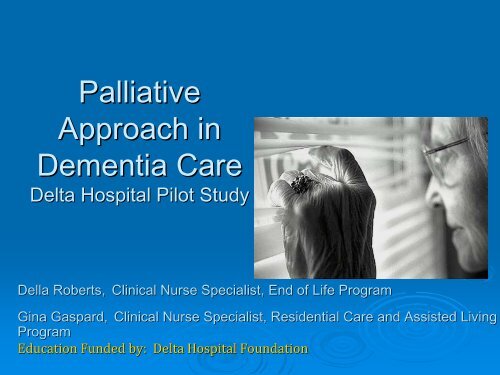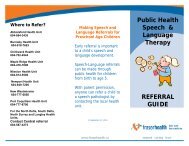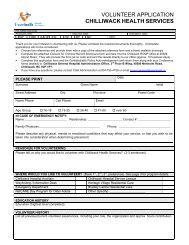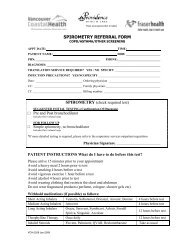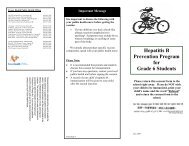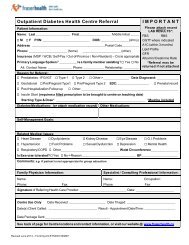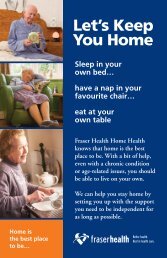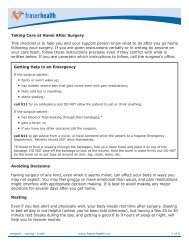Palliative Approach in Dementia Care - Fraser Health Authority
Palliative Approach in Dementia Care - Fraser Health Authority
Palliative Approach in Dementia Care - Fraser Health Authority
- No tags were found...
You also want an ePaper? Increase the reach of your titles
YUMPU automatically turns print PDFs into web optimized ePapers that Google loves.
<strong>Palliative</strong><strong>Approach</strong> <strong>in</strong><strong>Dementia</strong> <strong>Care</strong>Delta Hospital Pilot StudyDella Roberts, Cl<strong>in</strong>ical Nurse Specialist, End of Life ProgramG<strong>in</strong>a Gaspard, Cl<strong>in</strong>ical Nurse Specialist, Residential <strong>Care</strong> and Assisted Liv<strong>in</strong>gProgramEducation Funded by: Delta Hospital Foundation
<strong>Dementia</strong> is aprogressive term<strong>in</strong>alillness for which thereis no cure.Studies found that dementia is not viewed as aterm<strong>in</strong>al illness(Sampson,2006; Mitchell, 2004; Morrison & Siu, , 2002).
Ambiguous Dy<strong>in</strong>g
Frameworks
Assumptions‣ <strong>Palliative</strong> care ought to be a corecompetency when car<strong>in</strong>g for people withdementia.‣ Quality of care for people liv<strong>in</strong>g and dy<strong>in</strong>gwith dementia will improve whencaregivers’ knowledge, confidence andskill <strong>in</strong>crease.
Will a 4 hour <strong>in</strong>terdiscipl<strong>in</strong>aryworkshop:‣ Raise awareness of dementia as aprogressive illness?‣ Increase staff confidence, skill andknowledge to meet the needs of peopleliv<strong>in</strong>g and dy<strong>in</strong>g with dementia and theirfamilies?‣ Encourage strategies to be <strong>in</strong>corporated<strong>in</strong>to daily care?
Participants n=60‣ Interprofessional (RN, RPN, OT, PT,RCA, SW)‣ Varied roles (direct care providers,managers, educators)‣ Acute and residential complex care
Pilot Development‣ Literature review‣ Curriculum from Car<strong>in</strong>g Journey: Bettercare, Better life for people with dementia &Hospice <strong>Palliative</strong> <strong>Care</strong> Basic andEnhanced days‣ <strong>Fraser</strong> <strong>Health</strong> best practice guidel<strong>in</strong>es‣ Focus groups (family & leaders)‣ Ref<strong>in</strong>ed workshop based on feedback
Workshop Content‣ Person with dementia‣ Family of person withdementia
EVALUATION‣ Identify challenges at start of session‣ Satisfaction survey• Quantitative (excellent/very good/good/fair/poor)‣ Knowledge pre test/ post test• Multiple choice/ True & False‣ Self evaluation• Qualitative (I learned that…)‣ Family feedback‣ Leadership feedback
F<strong>in</strong>d<strong>in</strong>gsStaff satisfiedRated very good-excellentKnowledge <strong>in</strong>creased 10%Confidence <strong>in</strong>creasedAttitudes challengedAwareness raised1-1010 scale 7.2 - 8.3“… they are needy families, notdifficult”“Inform family dementia is aprogressive disease”Compassion triggered“Put yourself <strong>in</strong> their reality”
Theme one: I can connect with andcomfort the person with dementia.“Don’t t under value the 30seconds you spend withsomeone - residents live <strong>in</strong>the moment.”“Enter <strong>in</strong>to the patient’s s realityand emotion.”“Changes <strong>in</strong> resident could bepa<strong>in</strong>!! Behaviours havemean<strong>in</strong>g.”
Theme two: I can talk about deathand dy<strong>in</strong>g.“<strong>Palliative</strong> care starts when clients enterresidential care with dementia.”“Initiate conversations re frailty/dy<strong>in</strong>g with afamily member.”“It is okay to talk about dy<strong>in</strong>g with familymembers.”
Theme three: Families need my care too.“Be more patient, th<strong>in</strong>k more aboutwhere they [family] are com<strong>in</strong>gfrom.”“Family knows the person best - weknow dementia the best. Familieswant to teach us how to care fortheir loved one.”“Be honest.”
Theme four: A palliative approachtakes a team“Work to have family’s s voiceheard - don’t t want to repeatstories over and over.”“Encourage nurses and care staffto have advanced careplann<strong>in</strong>g <strong>in</strong> place.”“As a team approach we need tocommunicate much better-bemore comfort<strong>in</strong>g.”
Mov<strong>in</strong>g Knowledge to PracticePractice ChangeAwarenessConfidenceKnowledge
Implications‣ Build dementia and palliativecare as core competenciesfor nurs<strong>in</strong>g staff work<strong>in</strong>g <strong>in</strong>residential care and medicalunits.• Develop a strategy to spreadthis workshop and susta<strong>in</strong>change <strong>in</strong> behaviour.• Offer as <strong>in</strong>terdiscipl<strong>in</strong>ary,<strong>in</strong>tersectoral education
Further research:‣ What competencies <strong>in</strong> dementia care dohealth professional possess and whatareas require improvement to deliver apalliative approach?crackskullbob.squarespace.com/journal/lab-coa...
Further Read<strong>in</strong>g‣ Birch, D., & Draper, J.(2008). A critical literaturereview explor<strong>in</strong>g the challenges of deliver<strong>in</strong>geffective palliative care to older people withdementia. Journal of Cl<strong>in</strong>ical Nurs<strong>in</strong>g, 17, , 1144-1163.‣ Small, N., Froggatt, K., & Downs, M., (2007).Liv<strong>in</strong>g and Dy<strong>in</strong>g with <strong>Dementia</strong>: Dialogues about<strong>Palliative</strong> <strong>Care</strong> .‣ Lusk, C. (2007). The need for palliative/end of lifecare programs <strong>in</strong> LTC. Canadian Nurs<strong>in</strong>g Home,18 (4).‣ Gaspard, G. & Roberts, D. (2009). <strong>Palliative</strong>dementia care requires a blended model.Canadian Nurs<strong>in</strong>g Home, 20 (1), 21-24.24.‣ Mann<strong>in</strong>g, Doug. Share my Lonesome Valley.
Comments?


